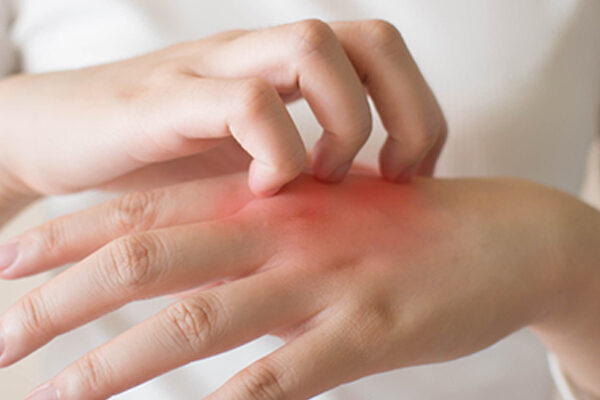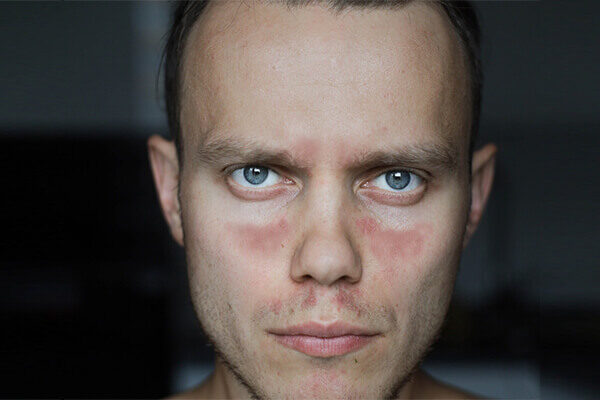Updated on March 28, 2022

INTRODUCTION
Psoriasis is a chronic skin condition characterized by red patches, flaky skin causing itching. Despite popular opinion, psoriasis is slightly more common in men than in women. Although Psoriasis in men having the same symptoms and treatment options, research says that men experience severe symptoms as compared to women.
If you are a male who is diagnosed with, or suffering from symptoms of psoriasis, here’s what you need to know.
WHAT IS PSORIASIS?
Let’s talk a little about the condition. What exactly is psoriasis and what happens in this condition? What are its symptoms and how do they affect men?
Psoriasis is a long-lasting skin condition that materializes in the form of red, itchy scaly patches. This happens because of an extra generation of skin cells that leads to overgrowth of skin. Normally, skin cells are produced and replaced every 3 to 4 weeks. But, in psoriasis, this turnover happens every 4 to 7 days. This leads to skin buildup and a number of symptoms. These symptoms come in episodes, some might experience mild irritation and itching while others might have to deal with severe pain and limited movements. These episodes can last from weeks to months before easing out and stopping.
PSORIASIS IN MEN
Although this condition affects both genders equally, dealing with the stigma of having a visible skin condition can take a toll on your mental health. You might be wondering if this might affect your intimacy and dating life, or maybe your plans to start a family might be changed.
Psoriasis can change your daily routine. It is always the little things; such as the way you change your clothes, or the way you shave, your everyday dealing in professional life, and even your sleep patterns might be affected by this painful condition.
The key to surviving this chronic condition is through understanding your triggers, being patient and following your dermatologist’s instructions faithfully.
PSORIASIS TREATMENT VARIES AMONG SEXES
Although there is no definite cure, a number of treatment options are available for psoriasis in men. They are more or less the same as treatment for women with some changes in the prescription details. These treatment options may include one or a combination of any of the following:
- Topical ointments (e.g. vitamin D analogues), creams or gels
- Systemic medications (oral or injectables)
- Phototherapy
- Laser treatments
Your dermatologist can be your best friend when it comes to choosing the most beneficial treatment regime for you. It can be a mix of two or more treatment options, maybe some lifestyle changes, or a change of a treatment regime.
Do not change or stop any of your treatment without consulting your dermatologist. Some regimes might need to be altered or gradually reduced before completely stopping them altogether.
THE MENTAL & EMOTIONAL TOLL OF PSORIASIS
Taking care of your family and work while coping with psoriasis is a difficult task for anyone. This challenge is unrelated to the sufferer’s gender or the severity of the illness. Though sticking to a treatment plan that works is critical for dealing with psoriasis in men and women, the other side of the coin is to ensure that this disease does not negatively impact your mental health.
There are numerous strategies to deal with this emotional weight, from having a solid support system to discussing your problem with a health care specialist. There are a number of people who are talking about this condition, how it affected them and how they’re dealing with it. One such platform is the National Psoriasis Foundation which helps millions of people around the US to cope up with the dreading condition.
MANAGING MALE-SPECIFIC SYMPTOMS
There are a total of 5 types of psoriasis in men and women, differentiated on the basis of its location:
-
Genital Psoriasis:
Psoriasis can affect different parts of your genitalia, including:
- Penis shaft or scrotum
- Crease between the thighs and genitals
- Skin surrounding the anus and in-between the buttocks
- Pubic area
Although seemingly embarrassing, genital psoriasis is not contagious and is totally manageable. All you have to do is to take some precautionary measures such as using a lubrication, clearing the affected areas after having intercoarse, avoid sex if the skin is raw and most importantly, talk to your dermatologist and get it treated.
-
Scalp Psoriasis:
Around 60% of people dealing with psoriasis also have it on the scalp. This affects your hairline, forehead, back of the neck and skin in & around the ears. The symptoms can range from dandruff looking fine scales to thick plaques covering the entire scalp. One complication of scalp psoriasis that women and men have to deal with equally is “Hair Loss”.
I know hair loss is scary, but worry not, American Academy of Dermatology (AAD) have given some tips to help reduce the hair loss due to psoriasis. AAD says:
- Use gentle brushing to remove the scales: Hard or rough brushing can lead to hair breakage and hair fall.
- Skip the pick and scrap the scratch: AAD says that scratching and picking on psoriasis can make it worse leading to increased hair loss.
- Let your hair air-dry: Over-drying your hair through a blow dryer can lead to worsening of the symptoms.
- Apply medication on the scalp: Direct application may help with a speedy recovery.
- Mix and match between medicated and non-medicated shampoo: Medicated shampoo causes the scalp and hair to dry out leading to hair breakage. Using a conditioner after every shampoo can help reduce this dryness.
-
Facial Psoriasis:
Psoriasis can affect the skin of your face too. It can strike your eyebrows, upper lips, nose, forehead and even your beard. If you have a beard and want to avoid the triggers that exacerbate psoriasis, here are some of the best ways to go about it:
- Clean the skin: use a gentle cleanser to remove the dirt off of your face.
- Condition that beard: use a beard conditioner, oil and a soft comb to detangle those long locks.
- To cut or not to cut: use shaving cream or oil before trimming with an electric razor or use scissors if you wanna keep them long.
-
Hands, Feet and Nails:
Psoriasis on the hands and feet (Palmoplantar Psoriasis) can challenge your quality of life. The pain can limit your mobility and refrain you from doing routine day-to-day tasks. Nail psoriasis affects multiple digits at a time and is more frequently seen in the fingernails as compared to the toenails. There are a number of treatment and precautionary measures to deal with this type of psoriasis:
- Topical ointments, the most common option.
- Phototherapy: light units specifically designed for the skin of hands and feet.
- Oral and other biologic treatments, if nothing else works.
- Keeping your nails as short and clean as possible can help prevent the triggering and worsening of nail psoriasis.
Reach out to a Dermatologist near you to find out which treatment option works best for you.
-
Skin Folds:
The type of psoriasis which affects the folds of skin including armpits, groin, area under the breasts is called Inverse or intertriginous Psoriasis. This type of psoriasis is more common in heavy weight people and those with deep skin folds. Rubbing and sweating can irritate the skin and worsen the symptoms.
As the moisture in these areas can trigger yeast or fungal infections, it would be wise to contact a dermatologist as soon as any of the symptoms appear.
THE TAKEAWAY
To sum it up, we can say that even though it’s the same condition and treatment options, the experience and challenges men face are slightly different from those in women.
As discussed, there are a number of treatment options available for this condition. However, all of them are for symptomatic relief and none of them provide a definite cure. Fortunately, doctors and researchers are working day and night to find a cure for this painfully chronic condition. There are various Psoriasis Clinical Trials in USA alone.
If you are thinking whether you can participate in these trials and whether you’ll be paid for them, then the answer is yes. All you have to do is search for “Paid Clinical Trials Near Me” and you will find a list of clinical research organizations conducting research near you. Participating in these trials will not only help you receive a novel treatment, but it might also help thousands of others who are suffering from psoriasis.




